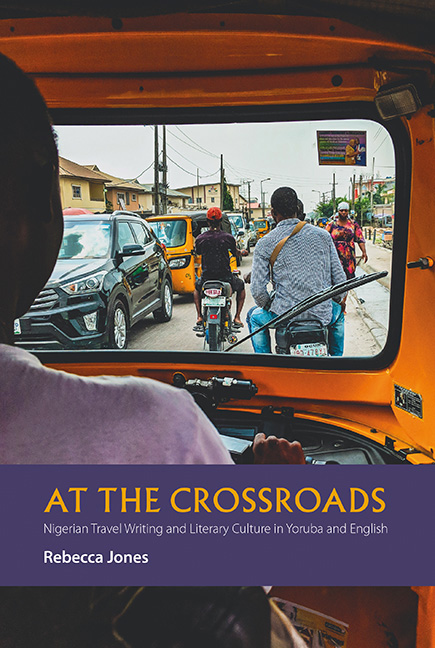Book contents
- Frontmatter
- Contents
- List of Illustrations
- Acknowledgements
- Note on Orthography
- Introduction
- 1 African Travel Writing: Genres of Writing and Forms of Travel
- 2 Travel Writing, Colonial Print Culture, and the Yoruba Newspapers of the 1920s
- 3 Isaac Délànỏ's The Soul of Nigeria, at the Crossroads of ‘Civilisation’
- 4 Journeys of Experience and Transformation: the Quest Narrative in Yoruba and English Fiction
- 5 Surveying and Serving Nigeria in National Travel Writing After the Civil War
- 6 ‘Nigeria is My Playground’: Travel for Travel's Sake in Twentyfirst Century Nigeria
- 7 From the ‘Dark Return’ to the ‘Open’ Nation: Diaspora Travel Narratives of Return to Nigeria
- Epilogue: Southwest Nigerian Travel Writing and Literary Culture at the Crossroads
- Bibliography
- Index
- Miscellaneous Endmatter
6 - ‘Nigeria is My Playground’: Travel for Travel's Sake in Twentyfirst Century Nigeria
Published online by Cambridge University Press: 12 October 2019
- Frontmatter
- Contents
- List of Illustrations
- Acknowledgements
- Note on Orthography
- Introduction
- 1 African Travel Writing: Genres of Writing and Forms of Travel
- 2 Travel Writing, Colonial Print Culture, and the Yoruba Newspapers of the 1920s
- 3 Isaac Délànỏ's The Soul of Nigeria, at the Crossroads of ‘Civilisation’
- 4 Journeys of Experience and Transformation: the Quest Narrative in Yoruba and English Fiction
- 5 Surveying and Serving Nigeria in National Travel Writing After the Civil War
- 6 ‘Nigeria is My Playground’: Travel for Travel's Sake in Twentyfirst Century Nigeria
- 7 From the ‘Dark Return’ to the ‘Open’ Nation: Diaspora Travel Narratives of Return to Nigeria
- Epilogue: Southwest Nigerian Travel Writing and Literary Culture at the Crossroads
- Bibliography
- Index
- Miscellaneous Endmatter
Summary
Contemporary Nigeria is not typically thought of as a mainstream tourist destination. Even Nigerian travel writer Pèḷú Awófèṣ ò,̣ who avidly promotes the country's potential for travellers, conceded in an interview with me in 2010 that he feared that ‘nobody will go anywhere in Nigeria specifically on vacation’. Nonetheless, as we saw in Chapter 1, the idea of travel for its own sake has had a limited but not insignificant resonance in southwest Nigeria throughout the twentieth century: in the notion of personal development and òḷ àjú associated with travel in many travel narratives, or in the newspapers’ promotion of travel as an improving, ‘civilised’ and relaxing leisure activity. In the postindependence era, there has been a growing interest in domestic tourism as both an aspirational leisure activity and a source of economic growth for the state, reflected in the publication of official tourist guides to Nigeria and the foundation of state tourism institutions such as the Nigeria Tourism Association (now the Nigeria Tourism Development Corporation) in 1962, the National Institute for Hospitality and Tourism in 1988, and the Federal Ministry of Culture and Tourism in 1999.
The press, too, has continued to promote tourism both within and beyond Nigeria. Today, many of Nigeria's newspapers host dedicated travel sections; these typically focus on domestic and international tourism news, information and PR pieces, although they occasionally publish short, first-person narratives describing journalists’ or readers’ own travels. Tourism journalism has undergone a professionalisation, including the foundation of the Association of Nigerian Journalists on Entertainment and Tourism and the Guild of Tourism Journalists, the latter of which is headed by Wálé Ojó-Lánre, a veteran of Nigerian tourism journalism. Some journalists have become known particularly for their extensive reporting on travel and tourism and for their occasional publication of narrative accounts of their own travels, such as Maurice Archibong, who wrote the ‘Travels’ column in the Daily Sun newspaper from 2003. Travel photojournalist and tourism professional John Olú Fáòṣèké has also published several works on tourism prospects in Nigeria and Africa, as well as a guidebook, Travellers’ Guide to Nigeria (1997).
Perceiving a gap in the state provision of travel infrastructure and marketing, private travel and tourism advocates have also sprung up to encourage Nigerians to travel within Nigeria.
- Type
- Chapter
- Information
- At the CrossroadsNigerian Travel Writing and Literary Culture in Yoruba and English, pp. 185 - 216Publisher: Boydell & BrewerPrint publication year: 2019



